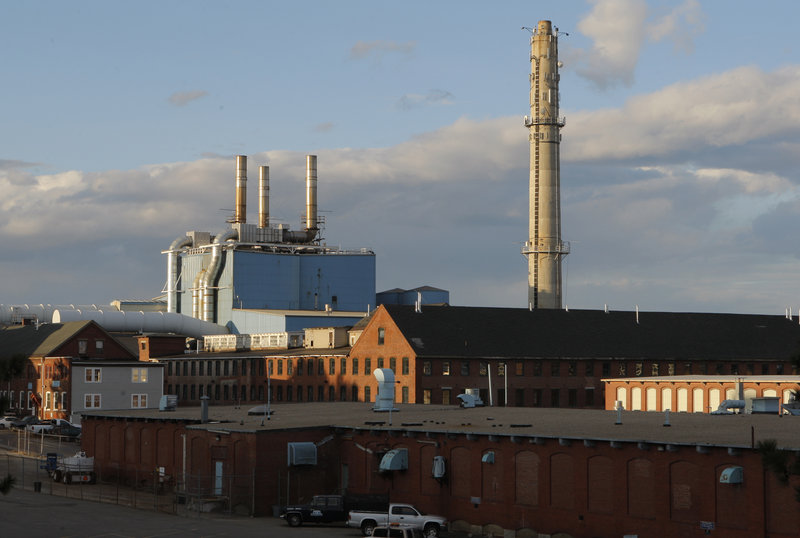AUGUSTA — A bill in the Maine Legislature that would have paved the way for closing the controversial Maine Energy Recovery Co. trash incinerator in downtown Biddeford is dead for this year.
The Maine Senate, without debate, voted today not to send a bill to committee that would have authorized the state to sell the Juniper Ridge landfill in Old Town to the incinerator’s owner, Casella Waste Systems.
Casella would have used the landfill to bury waste that is now burned in the plant, which would have been sold to Biddeford for $10 million and then shut down.
Reacting to today’s action in Augusta, officials at both the city and Casella vowed to move ahead and seek other solutions.
“We’ll keep talking to Biddeford,” Joe Fusco, a spokesman for Vermont-based Casella Waste Systems, told The Portland Press Herald.
Rep. Alan Casavant, D-Biddeford, said he recognized that the late-session proposal faced challenges, but that he planned to stay on track for a meeting with Casella later this week.
Casavant, who also is Biddeford’s mayor, noted that the city and 13 other communities have disposal contracts with MERC, and will continue to need someplace to take their trash.
“That’s always been a big stumbling block,” he said.
The proposal to close MERC highlights the broader role of waste-to-energy plants in preserving the state’s limited landfill space, as well as changing trends in solid waste disposal.
“Our goal is to capture as much waste as possible as a resource,” Fusco said.
Casella, Fusco said, is moving away from burning and burying waste to pulling out more recyclables and composting food waste and organic materials. It also wants to capture more methane gas from landfills for power generation and to lower greenhouse gas emissions, something it does now at five landfills, including a now-closed facility in Hampden.
“We believe that’s where the industry is going in the next two decades,” he said.
Casella owns MERC and operates the state-owned Juniper Ridge landfill in Old Town. The plan to close MERC and sell Juniper Ridge to Casella raises questions about whether such a proposal would violate the state’s waste-handling policy.
Maine currently has the capacity to dispose of 17 million tons of municipal garbage, residues from waste to energy plants and construction debris.
The state’s 23-year old policy, enacted by the Legislature, mandates how to manage this waste. It sets a priority order: Reduce, reuse, recycle, compost, waste-to-energy and landfill.
“Landfilling is the least desirable option under Maine’s solid waste management hierarchy,” according to the state’s most recent Solid Waste Generation & Disposal Capacity Report, which was presented to lawmakers in January. “As policy, all other solid waste management options should be considered and exercised to the greatest extent possible, prior to landfilling wastes…”
The hierarchy reflects the fact that landfills are costly to build and controversial to locate.
The 25-year old MERC plant in Biddeford was built to replace old, polluting landfills. It’s one of four waste-to-energy plants; the others are in Portland, Auburn and Orrington. Together they burned 35 percent of the state’s solid waste, or 856,941 tons in 2010, according to the latest state report.
The plants have a combined power output of 62 megawatts. Maine has less trash in the winter, so to get enough “fuel” year-round to meet their energy contracts, the plants took 294,594 tons from out of state in 2010. MERC, which burned 284,718 tons, accepted 185,960 tons from out of state – 65 percent of the total.
That doesn’t mean 185,960 tons of solid waste, mostly from Massachusetts and New Hampshire, would wind up in Old Town, Fusco said. The quanity would depend on the contract price for disposal and whether closer, less expensive options are available, since Old Town is 136 miles farther north than Biddeford.
“Solid waste disposal is a fluid market,” he said.
Also in play is whether Maine’s three other waste-to-energy plants might be able to burn some of the trash that now goes to MERC.
“Those discussions have been going on,” said Sen. Tom Saviello, R-Wilton, who chairs the Legislature’s Natural Resources committee.
Saviello made the motion to postpone hearing the bill in his committee, which led to it being tabled for this session.
“There are too many moving parts,” Saviello said.
That view also was expressed by the office of Gov. Paul LePage, which said it didn’t have enough time to study the late-session proposal and understand the impact to the state’s waste-handling system. LePage supports the concept of allowing the state to negotiate the sale of Juniper Ridge, according to Adrienne Bennett, his spokesperson, but wants to make sure Maine gets the best financial deal possible.
Waste-to-energy plants preserve landfill space. Combustion reduces waste volume on average by 90 percent and weight by two-thirds. But they’ve fallen out of favor in the United States, plagued by problems, including air emissions and noise.
Send questions/comments to the editors.




Success. Please wait for the page to reload. If the page does not reload within 5 seconds, please refresh the page.
Enter your email and password to access comments.
Hi, to comment on stories you must . This profile is in addition to your subscription and website login.
Already have a commenting profile? .
Invalid username/password.
Please check your email to confirm and complete your registration.
Only subscribers are eligible to post comments. Please subscribe or login first for digital access. Here’s why.
Use the form below to reset your password. When you've submitted your account email, we will send an email with a reset code.